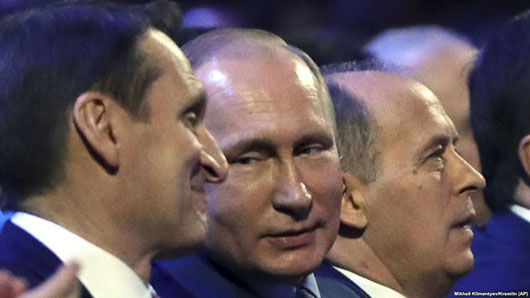by WorldTribune Staff, February 1, 2018
In what a former CIA station chief in Moscow called a “highly unusual” occurrence, the leaders of Russia’s three top intelligence agencies were all in Washington, D.C. in recent days.
Only one of the three recent visits by the spy chiefs was confirmed by Russia.

Sergei Naryshkin, head of the Foreign Intelligence Service (SVR), Aleksandr Bortnikov, director of the Federal Security Service (FSB), and Col. Gen. Igor Korobov, director of Russian General Staff’s Main Intelligence Directorate (GRU), all paid visits to the U.S. capital in the past week, according to a Feb. 1 report by Radio Free Europe/Radio Liberty (RFE/RL).
In a January 2017 assessment, U.S. intelligence agencies said the FSB, considered Russia’s main domestic intelligence agency, and the GRU, the Russian military’s intelligence arm, oversaw a hacking-and-propaganda campaign aimed at influencing the 2016 U.S. presidential election.
The SVR was linked by U.S. law enforcement to a ring of “deep cover” agents who were living in the United States and arrested and deported in 2010.
Russian Ambassador to the U.S. Anatoly Antonov confirmed that Naryshkin was in Washington to meet with U.S. officials about terrorism and other matters.
The visits by Bortnikov and Korobov were not previously known.
The Washington Post reported on Jan. 31 that Bortnikov had met with CIA Director Mike Pompeo, as did Naryshkin. It wasn’t clear whom Korobov may have met with.
“I can’t recall any time in the last 15 years” that all three Russian agency chiefs were in the U.S. capital at the same time, Steven Hall, a former CIA station chief in Moscow, told RFE/RL. “It’s highly unusual.”
U.S. Ambassador to Russia Jon Huntsman, in a radio interview in Moscow on Jan. 30, confirmed that Pompeo had met with Russian spy officials, but did not say where the meeting occurred or who attended.
In the last week, Pompeo “has had probably the most important meetings on counterterrorism that we’ve had in a very, very long time, at the senior levels,” Huntsman told Ekho Moskvy radiо.
Pompeo told the BBC on Jan. 29 that, while U.S. and Russian intelligence agencies had cooperated, Russia is still considered an adversary. “I haven’t seen a significant decrease in their activity,” he said.
RFE/RL noted that “During his tenure, Hall says, it was always a big deal, politically and logistically, whenever a senior Russian intelligence officer got in to see a U.S. counterpart, giving Moscow a way to assert they were on equal footing with the United States.”
The Russians “consider it a big political win if they can do it. There is certainly a political perspective,” Hall told RFE/RL. “So it’s particularly strange under these circumstances that we would want to give them something like that.”
Subscribe to Geostrategy-Direct __________ Support Free Press Foundation
